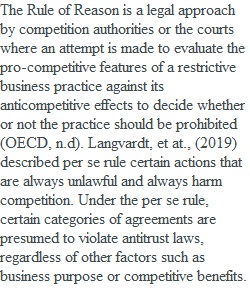


Q Your initial discussion thread is due on Day 3 (Thursday) and you have until Day 7 (Monday) to respond to your classmates. Your grade will reflect both the quality of your initial post and the depth of your responses. Refer to the Discussion Forum Grading Rubric under the Settings icon above for guidance on how your discussion will be evaluated. Anti-Trust: The Sherman Act [WLOs: 4] [CLOs: 1, 2] RSS Feeds Watch this video featuring John Bathke, faculty member at the Forbes School of Business and Technology. TranscriptDownload Transcript Prior to beginning work on this discussion, • Review Chapter 49 of the course textbook. Coed Theatres (Coed), a Cleveland area movie theater booking agent, began seeking customers in southern Ohio. Shortly thereafter, Superior Theatre Services (Superior), a Cincinnati booking agent, began to solicit business in the Cleveland area. Later, however, Coed and Superior allegedly entered into an agreement not to solicit each other’s customers. The Justice Department prosecuted them for agreeing to restrain trade in violation of § 1 of the Sherman Act. Under a government grant of immunity, Superior’s vice president testified that Coed’s vice president had approached him at a trade convention and threatened to start taking Superior’s accounts if Superior did not stop calling on Coed’s accounts. He also testified that at a luncheon meeting he attended with officials from both firms, the presidents of both firms said that it would be in the interests of both firms to stop calling on each other’s accounts. Several Coed customers testified that Superior had refused to accept their business because of the agreement with Coed. The trial court found both firms guilty of a per se violation of the Sherman Act, rejecting their argument that the rule of reason should have been applied and refusing to allow them to introduce evidence that the agreement did not have a significant anticompetitive effect. • What is the rule of reason and how does it differ from the per se rules? • Should the rule of reason have been applied in this case? Explain why or why not. Your initial response should be a minimum of 200 words. Guided Response: Respond to at least two of your peers’ posts (as well as any comments made by your instructor) in a substantive manner and provide information or concepts that they may not have considered. Each response should have a minimum of 100 words. Support your position by using information from the week’s readings. You are encouraged to post your required replies earlier in the week to promote more meaningful and interactive discourse in this discussion forum. Continue to monitor the discussion forum until Day 7 and respond with robust dialogue to anyone who replies to your initial post. • • What is the rule of reason and how does it differ from the per se rules? Should the rule of reason has been applied in this case? Explain why or why not
View Related Questions